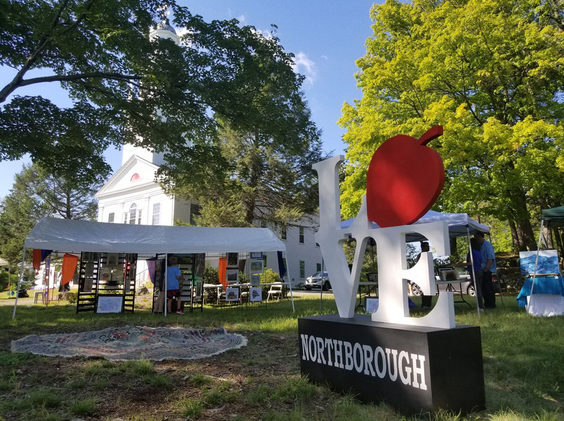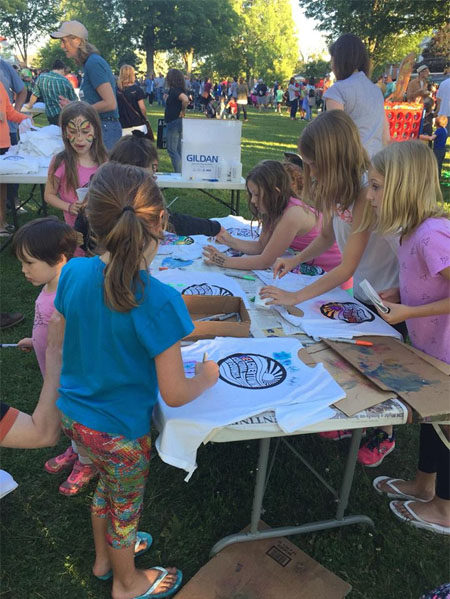Power of Culture Blog
LCC Member Nano Interview – Sept
Shining a light on the vital work of Local Cultural Councils in our cities and towns
Mina Kim, Program Officer
Local Cultural Councils Reimagine Their Role in Community-wide Planning

Festivals evoke joy, awe, and a sense of place as people encounter experiences and each other in public spaces. As anyone who has organized a festival knows, it takes enormous dedication and resources to create an event that resonates with residents and visitors, and builds upon the historical and present fabric of a place, while looking toward the future. In light of the commitment and energy required, why is it that communities decide to host festivals, and what are some essential ingredients necessary in executing a “successful” festival?
The Belchertown and Northborough Cultural Councils launched new festivals in their towns to respond to community needs that were not being addressed. Belchertown, with an increasing population of young families, an inactive Town Common, along with few dining options, created the Belchertown Food Truck Festival in 2017 that drew over 1,000 attendees in its first year. Northborough presented the First Annual Culture Fest of Music and Arts in 2018 after gathering input from residents who wanted free, family-friendly arts and culture programs that reflected the diversity of the town.
“The big [goal] was to build a holistic viewpoint of all of the programming of the town,” Jen Turner, Chair of the Belchertown Cultural Council shared, as she and fellow council members walked through the process of launching a festival in their town. Initially deterred by the time-intensive rigmarole of the town’s public events application process, it took the Belchertown Cultural Council about a year to reevaluate the Council’s interest in and capacity to undertake a festival before officially launching the planning for the inaugural Belchertown Food Truck Festival.
The first year of the Food Truck Festival attracted over 1,000 people who enjoyed recreational activities on the Town Common, live music, and delicious offerings from four food trucks. In its second year, the Council expanded upon the Food Truck Festival to present three festivals in summer 2018. In between in April 2018, the Council also put on the Belchertown Art Walk during the Boch Center’s ArtWeek, which included art exhibits, tea with “ghosts” at the Stone House Museum, and cookie designing and pizza-making at local eateries.
The key to success, according to the Belchertown council members, lies in cultivating relationships early on in the planning process with the municipality, community organizations, local businesses, and any entity or individual that expresses an interest in elevating the town.
“Shaking hands and kissing babies, going to meet with people, getting to know them, seeing who they are in person, and talking to them face to face is the key component in building the relationships,” said Jen.
In reaching out to the municipality, the Belchertown Cultural Council acknowledged the inevitable learning curve facing the Council and town at the outset, and recognized that organizing a public event required a large commitment not only from council members, but town staff as well, who would be taking on work beyond the usual scope of their duties. This mindful and relational approach strengthened the Council’s case for more public programming, as local organizations and municipality felt involved and realized the mutual benefits served by partnering with the Council, especially around raising visibility of existing town resources and opportunities.

In addition to gaining early “buy-in” from the municipality and community organizations, the Northborough Cultural Council undertook several preliminary steps to reflect on how the Council might broaden its role beyond a granting entity in the town. With a fifty percent turnover on the Council, new and existing members considered how to develop into an organization that was more embedded in the municipality, and could provide meaningful programming for Northborough.
As Suzanne Cox, member of the Council shared, “We started with [the question] ‘What does the community want from us as a cultural council?’,” which led to the Council distributing surveys, holding coffeehouse meet and greets, and reserving booths at other town events to represent the Council and conduct further outreach. Public engagement was supplemented with coordinating the Council’s first mini-regional meeting with neighboring local cultural councils from Marlborough and Westborough to exchange ideas, experiences, and tips around Council activities. After identifying that the community wanted free arts and culture programs that reflected the diversity of Northborough, each Northborough council member also went around to other towns and cities to research different types of festivals and cultural events taking place in Massachusetts.
Throughout all this, Northborough Cultural Council focused on refining and adapting the Council’s mission and goals to reflect the voices of its own members and the greater public, before shaping the vision for the First Annual Northborough Culture Fest of Music and Arts.
“Setting the vision statement is very important. If people feel like their voices are heard, they become more invested, and you get more mileage as a group,” stated Selvi Oyola, Chair of the Northborough Cultural Council, while emphasizing the need for inclusivity and a strong foundation upon which to proceed as a Council.
The new strategic planning of the Council helped its members present the Council as a cultural convener and catalyst for the town, in addition to developing new partnerships with area organizations. This became useful when introducing the Council’s idea for a cultural festival to others in Northborough, and in securing space for the festival. Unlike Belchertown, which has a town common, Northborough does not. Limited in resources, the Council reached out to organizers of AppleFest, a well-established festival in the town. The Council benefited from the infrastructure already put in place by the annual AppleFest, including the name recognition and publicity that came with collaborating with a known entity. Site selection remained a hurdle, but in working with the First Parish Church Unitarian, the Council was able to secure a grassy knoll on the church’s front lawn.
For the Northborough and Belchertown Cultural Councils, the Select Board was crucial in connecting the Councils to the municipality. Both Councils had at least one Select Board member who served as a liaison between the Council and municipality for their respective events, as well as other initiatives. When the Belchertown Cultural Council decided to request funds from the town, the Council’s Select Board liaison guided the Council through the submission process for a citizen petition, which resulted in the town providing $4,000. Council members of both towns shared that the Councils have become more involved in broader community initiatives, such as the master planning process in Northborough, and the redevelopment of the Belchertown State School.
Festivals require a lot of work, but they are a wonderful way to build meaning, identity, and relationships within and between communities. In preparing to host a new festival or any public event, the Northborough and Belchertown Cultural Councils recommend the following tips:
For more suggestions and an in-depth conversation on both Councils’ experiences, please listen to the full Convo here, featuring Belchertown Cultural Council: Jen Turner, Trista Hevey, Jennifer Whitehead; and Northborough Cultural Council: Suzanne Cox, Selvi Oyola, Bich Nguyen):